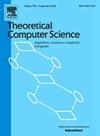环状词的一元论
IF 0.9
4区 计算机科学
Q3 COMPUTER SCIENCE, THEORY & METHODS
引用次数: 0
摘要
对于哪些一元谓词 P1、......、Pm,〈N;<,P1,......,Pm〉结构的 MSO 理论是可解的?我们考察了这一领域的现状,并由此研究了近周期词、形态词和环状词的组合性质。在此过程中,我们证明,如果每个 Pi 都可以由某类环状动力系统生成,那么相应的 MSO 理论就是可解的。我们给出了环状词的各种应用,包括 [1] 的最新结果:〈N;<,{2n:n∈N},{3n:n∈N}〉的 MSO 理论是可判定的。本文章由计算机程序翻译,如有差异,请以英文原文为准。
The monadic theory of toric words
For which unary predicates is the MSO theory of the structure decidable? We survey the state of the art, leading us to investigate combinatorial properties of almost-periodic, morphic, and toric words. In doing so, we show that if each can be generated by a toric dynamical system of a certain kind, then the attendant MSO theory is decidable. We give various applications of toric words, including the recent result of [1] that the MSO theory of is decidable.
求助全文
通过发布文献求助,成功后即可免费获取论文全文。
去求助
来源期刊

Theoretical Computer Science
工程技术-计算机:理论方法
CiteScore
2.60
自引率
18.20%
发文量
471
审稿时长
12.6 months
期刊介绍:
Theoretical Computer Science is mathematical and abstract in spirit, but it derives its motivation from practical and everyday computation. Its aim is to understand the nature of computation and, as a consequence of this understanding, provide more efficient methodologies. All papers introducing or studying mathematical, logic and formal concepts and methods are welcome, provided that their motivation is clearly drawn from the field of computing.
 求助内容:
求助内容: 应助结果提醒方式:
应助结果提醒方式:


